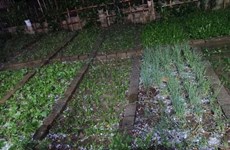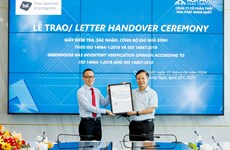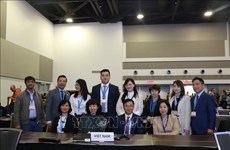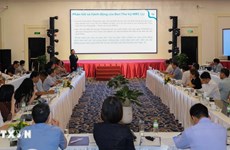Creating energy from rice husks
Vietnamese and foreign energy experts
and businesses gathered in Ho Chi Minh City on Nov. 12 for a seminar to
discuss the potential for energy development using rice husks.
Vietnamese and foreign energy experts
and businesses gathered in Ho Chi Minh City on Nov. 12 for a seminar to
discuss the potential for energy development using rice husks.
At the seminar, the International Financial Corporation (IFC) announced a comprehensive research project co-sponsored by Finland , Ireland , the Netherlands , New Zealand and Switzerland on turning rice husks into a clean energy source in Vietnam , one of the leading rice producers in the world.
Vietnam can use one-fifth of its total output of around 7.5 million tonnes of rice husks in 2010 for power generation. A power plant fuelled by this organic material can turn out 1-1.2 TWh/year with possible design capacities of between 160-180MW, said the research.
IFC also noted that the best area for such power projects is the Mekong delta region – the country’s biggest granary--where only 15-20 percent of rice husk volume is used and most of the rice husking plants are near rivers and canals which are convenient for transportation at low cost. Rice-husk fuelled power projects will considerably reduce CO2 emissions and the amount of unneeded rice husks usually dumped into rivers and canals.
However, the research also pointed out the financial weakness of the plan, as the investment in producing one MW of power from such materials will be around 1.5 times higher than other sources and all the technology needed to produce it will need to be imported.
Deputy Head of the Ministry of Industry and Trade’s Energy Department Le Tuan Phong said that his ministry and the World Bank are building a legal framework to encourage renewable energy development, including energy the from rice-husks. A decree on the issue will be presented to the Government at the end of the year, he added.
At present, there are at least three projects using rice husks in the south, namely the Dinh Hai rice husk fuelled thermoelectric power plant in Can Tho city and the Holcim cement project. The third one is the 18.6 million USD 10MW power plant in Tien Giang province, Phong said.
WB representative Richard Spencer said that the bank will provide either loans or technical assistance to rice husk fuelled power projects in the country.
In the meantime, the IFC committed to set up the relations between banks and local and foreign financial institutions to ensure a flexible financial mechanism for such projects.
The IFC now has a 400 million USD fund to assist small rice husk fuelled power projects in many countries, said Karla Quizon, head of the IFC’s sustainable social and environmental development section in the Mekong Delta./.
At the seminar, the International Financial Corporation (IFC) announced a comprehensive research project co-sponsored by Finland , Ireland , the Netherlands , New Zealand and Switzerland on turning rice husks into a clean energy source in Vietnam , one of the leading rice producers in the world.
Vietnam can use one-fifth of its total output of around 7.5 million tonnes of rice husks in 2010 for power generation. A power plant fuelled by this organic material can turn out 1-1.2 TWh/year with possible design capacities of between 160-180MW, said the research.
IFC also noted that the best area for such power projects is the Mekong delta region – the country’s biggest granary--where only 15-20 percent of rice husk volume is used and most of the rice husking plants are near rivers and canals which are convenient for transportation at low cost. Rice-husk fuelled power projects will considerably reduce CO2 emissions and the amount of unneeded rice husks usually dumped into rivers and canals.
However, the research also pointed out the financial weakness of the plan, as the investment in producing one MW of power from such materials will be around 1.5 times higher than other sources and all the technology needed to produce it will need to be imported.
Deputy Head of the Ministry of Industry and Trade’s Energy Department Le Tuan Phong said that his ministry and the World Bank are building a legal framework to encourage renewable energy development, including energy the from rice-husks. A decree on the issue will be presented to the Government at the end of the year, he added.
At present, there are at least three projects using rice husks in the south, namely the Dinh Hai rice husk fuelled thermoelectric power plant in Can Tho city and the Holcim cement project. The third one is the 18.6 million USD 10MW power plant in Tien Giang province, Phong said.
WB representative Richard Spencer said that the bank will provide either loans or technical assistance to rice husk fuelled power projects in the country.
In the meantime, the IFC committed to set up the relations between banks and local and foreign financial institutions to ensure a flexible financial mechanism for such projects.
The IFC now has a 400 million USD fund to assist small rice husk fuelled power projects in many countries, said Karla Quizon, head of the IFC’s sustainable social and environmental development section in the Mekong Delta./.













